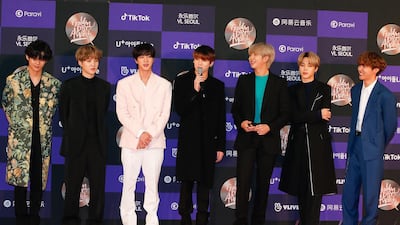What's in a hashtag? For the throngs of K-pop fans across the world, it seems the answer is: quite a lot. After all, Twitter users who follow the latest trending tags and phrases may have noticed that these days, most of the popular ones on the platform seem to really focus on K-pop.
One recent example was when Exo boy band member Chen announced he was getting married and his fiancee was pregnant. His name, as a hashtag, immediately became a trending topic and featured in more than 2.38 million tweets. It was even huge news here in the UAE.
While showing the power of the group's fan base, it also proved how much K-pop fans in general use Twitter as a platform to try to show support and appreciation in the hope their messages are seen by their favourite stars. Last year, there were 6.1 billion tweets about K-pop globally
The rise of K-pop and Twitter
When the genre first broke out of Korea, the scene was different for artists. Acts such as Wonder Girls, Girls' Generation, 2NE1 and Big Bang started to achieve success in other Asian countries in the early and mid-2000s, but had limited exposure. At about the same time, Twitter was founded. The platform didn't really take off until 2010, when users were posting about 50 million tweets per day.
In December 2012, BTS, an unknown group at the time, opened their Twitter account. It would be another six months before they released their first single, but they had already begun to build a relationship with their fans who would go on to be called the "Army".
Over time, the group began posting behind-the-scenes clips, handwritten letters and candid images, which proved to be a successful way of promoting their music, as well as showing a different side to the members of the band. Even more importantly, BTS were available to everyone, at the same time, regardless of where they were in the world.
With 23.6 million Twitter followers today, BTS found a formula that other bands have started to emulate. "We observed K-pop conversations popping up all around the world with the power of borderless media platforms like Twitter," says YeonJeong Kim, head of global content partnerships at Twitter Korea.
"It enabled K-pop groups to be exposed at global scale without any physical limitations. Fans can get news from the K-pop community on Twitter in the fastest way and generate their conversations around K-pop artists.
So where do the hashtags come from?
What's interesting is that none of the top 50 most-followed accounts on Twitter belong to K-pop groups. However, it should be noted that followers and engagement are two completely different things and in the Mena region, engagement in K-pop-related themes has skyrocketed.
"Over the past few years, based on the Twitter data that we've seen, K-pop conversation in the UAE and the rest of the region has become more popular and surfaced as one of the top conversations in the UAE," says Kinda Ibrahim, director of media partnerships at Twitter Mena.
"Not only do we see a lot of engagement with the bands' and artists' accounts but we also see localised accounts, like Arabic accounts that are created to share updates by K-pop celebrities, and translate tweets by K-pop celebrities. In the UAE, we see that the engagement from these tweets is coming from both Arabic-speaking and non-Arabic-speaking users."
It is this fan base, which spans many countries and ethnicities, that seems to be propelling K-pop content into the stratosphere.
How fans in the UAE use Twitter
In October last year, fans of BTS wanted to get the group to perform in the UAE after they played in Saudi Arabia. Fans tweeted out their frustration with the simple hashtag #WeWantBTSinUAE. A social campaign was started by BangtanUAE, a Twitter fan account that asked for help to get related hashtags to trend every day for a week, including #BTSTourinUAE, #BTSinAD, #BTSxZayedSportsCity, #UAEArmywithBTSForever and #UAEwantsBTStour.
While BTS didn't respond to the campaign, the hashtags trended regionally on Twitter – thanks to retweets – showing how far K-pop fans are willing to go to get the attention of their favourite artists. For most fans of the genre, even if there's a small chance of some interaction or acknowledgement, it's worth it.
"We see fan-artist interactions live on Twitter all the time, with the artists thanking and answering questions from their fans, often in a mix of Korean and English, prioritising authenticity," Kim says.
"Overall K-pop maintains the purity and integrity of its genre, which makes it a unique phenomenon. What works to unite K-pop fans is the emotional resonance – big concepts like 'love yourself' that resonate across the board."


